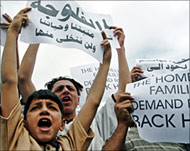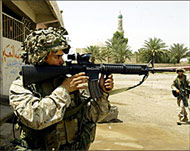Falluja truce has ‘weakened resistance’
The ceasefire brokered by Iraqi mediators in the Iraqi city of Falluja appears to have weakened the fighters battling US marines while also creating divisions within the Sunni Muslim community.

The fighters have been trapped by the US siege in the flashpoint city west of Baghdad for the past three weeks, after having initially succeeded in winning national support for their cause.
“The city has been completely surrounded for the past 10 days and the fighters are trapped inside and cannot leave,” said one local tribal chief, Mansur al-Hadithi, who is sympathetic to the resistance.
“Most of these fighters are from Falluja and determined to defend their city in case of an attack,” he said.
The Islamic Party and the Association of Muslim Scholars, composed of top Sunni clerics, which helped broker the truce, have now come under fire from within the Sunni minority over their mediation.
‘Satan’s inspiration’
A communique signed by the “Iraqi resistance in Falluja” said the truce was “an inspiration from Satan because it shifted the balance power in favour of the occupation forces.”
“Our mujahideen had the situation under control, and the truce weakened them,” said the statement. A nationalist leader accused the Islamic Party of campaigning for a truce from the first week of fighting “to extricate the Americans from the Falluja quagmire.”
 |
|
Residents of the besieged town |
“The insurgents enjoyed unprecedented support. Iraqis, by the hundreds, Sunnis or Shia, were flocking to Falluja with a single goal: prevent the Americans from crushing the resistance,” said Abd Al-Jabbar Kubaisi who leads “the National Iraqi Coalition”.
“Four provinces rebelled in the south, some Baghdad neighbourhoods were in a state of insurrection, villages around Falluja were controlled by armed men, supply lines of the Americans were cut. It was the beginning of civil disobedience,” he said.
But news of the ceasefire “disorganised the guerrilla movement and the solidarity movement ran out of steam,” he added, pointing out that new recruits who came to Falluja to swell resistance ranks had now left.
Continue struggle
However Sunni nationalists say Iraqi fighters who travelled to Falluja and have now returned to their homes will probably continue their struggle against occupation forces.
 |
|
US occupation forces continue |
“The Americans are deluding themselves if they think they can subdue Iraqis by force or through bribery. When an Iraqi is humiliated, he rebels,” said Muhammad Hamadani, a Falluja official.
The Islamic Party announced on Sunday it had negotiated a new accord with the US-led occupation forces to indefinitely extend the ceasefire.
“We have reached a new deal that extended the ceasefire indefinitely and secured an agreement on several new points,” said official Hashim al-Hasani.
He said the deal includes a ban on carrying weapons starting on Tuesday and the start of joint patrols by Iraqi police, para-military Iraqi Civil Defence Corps forces and occupation troops in the city on the same day.
But the Association of Muslim Scholars was more cautious and warned that US troops were trying to play for time and were determined to storm the city.
Lifting siege
The lifting of the Marines’ siege is the key demand of Falluja residents who face shortages of fuel and bread.
Last week, Falluja civic leaders and the occupation struck an accord that requires the fighters to hand in heavy weapons and allow joint patrols with Iraqi security forces and occupation troops.
But occupation commanders have said the weapons handed in so far are “junk”.
The Association of Muslim Scholars believe that a US troop withdrawal from Falluja is unlikely in the near future.
US Marines launched their offensive on 5 April after the killing of four US contractors in Falluja.